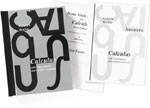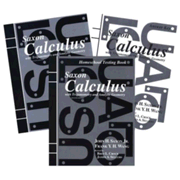Following the incremental method used in previous Saxon books, many students can learn calculus on their own. This is a challenging course, comparable to other Advanced Placement courses; students should be able to pass the AP test or the CLEP test after completing this course. At the beginning of the course, students review mathematical concepts required for calculus. They should have already completed Algebra 1, Algebra 2, and Advanced Mathematics in the Saxon series or through precalculus in other texts.
Instruction on new concepts begins with applications or conceptual explanations and ends with proofs, the opposite of the approach used in some other calculus books. Numerous applications in physics, chemistry, engineering, and business are used throughout the text.
Explanations are easy to understand so most students should be able to work independently. However, they should have someone to consult in case they encounter a concept that they have trouble understanding. Another alternative is to pick up another calculus text for comparison. Try a used bookstore or other inexpensive source. It is a good idea to purchase the Solution Manual to have handy in case a student is stumped by occasional problems.
Each new concept is presented in increments then reviewed in later lessons. Each lesson also includes constant review of previously learned concepts, which means that there is usually space for only a minimal amount of practice with the new concept within that lesson. This should not be a major problem since concepts are reviewed and expanded upon in later lessons.
Since concepts are often spread across a number of non-sequential lessons, it can sometimes be difficult to review or even locate a particular topic, although the index will usually help us locate the range of pages to search.
While any student who has mastered Advanced Mathematics should be able to use this text, those who are planning to major in mathematics might prefer or benefit more from a calculus course that is more theory-based. For future engineers or others who will use calculus in applications, this should be a great option.
There appear to be only a few topics missing from this course that are typically covered in first-year college calculus courses: partial derivatives, infinite series, and solid geometry. These topics might be picked up in a future class, but it might be wise to cover them from that alternate textbook if students plan to take the AP and skip that first college course.
The student text and answer key to "homework" problems are packaged together with tests for home educators in the homeschool kit. The Solution Manual is extra. It has complete solutions to all problems in problem sets in the texts. [Michael Courtney/Cathy Duffy]











